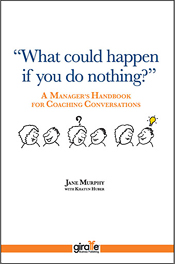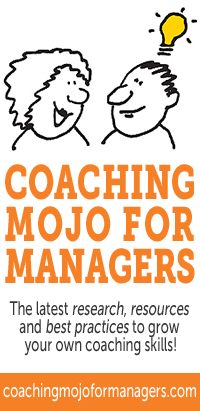Moving the Frame
 One of the best ways to find your way around a challenge is literally thinking around it. We often get fixed in place, wearing blinders and seeing only what’s right in front of us. If we could just change perspective, we would likely discover something new that we didn’t see before. In any challenging situation, there are always other views, other perspectives, and other realities.
One of the best ways to find your way around a challenge is literally thinking around it. We often get fixed in place, wearing blinders and seeing only what’s right in front of us. If we could just change perspective, we would likely discover something new that we didn’t see before. In any challenging situation, there are always other views, other perspectives, and other realities.
One of the key techniques of coaching is re-framing. The coach listens intently and then poses questions that “move the frame.” You can do the same as a manager in coaching conversations with your people.
If someone is dwelling on what’s not working, focus the discussion on what is working. When someone on the team is pushing back and causing frustration instead of contributing, ask some questions that move the frame and invite her to consider what hurdles her teammates are dealing with. Get her to stand in the others’ shoes.
Re-framing is scalable, too. It can give a whole team a clearer picture of how their work affects the mission, your customers, and your colleagues. This perspective can afford a more holistic view of their contribution, and a better understanding of the impact of their performance. Moving the frame can also suggest new options or alternatives to win broader buy-in and greater success for the work at hand.
You can leverage your coaching role to expand the list of options for meeting whatever challenges your people face. In your conversations, include the following kinds of thought provoking questions:
- What-ifs, like: What if you delegated that instead of doing it yourself?
- What roadblocks can you anticipate, so you can plan for them?
- What was successful?
- When did he deliver on his promise?
- If you were able to influence the sales plan, what would you do?
- What’s the worst that could happen? What’s the best that could happen?
Shifting your perspective, stepping into someone else’s shoes, and role-playing alternatives presents a whole new picture of reality. Re-framing can deliver unexpected solutions, greater harmony with colleagues, and hefty increases in performance. That would be suitable for framing.
How have you helped someone by re-framing a situation? How have you been helped by having a situation re-framed for you?
If you found this post helpful, check out “About the Book” on this blog, and order yourself a copy of “What could happen if you do nothing?” A manager’s handbook for coaching conversations.








